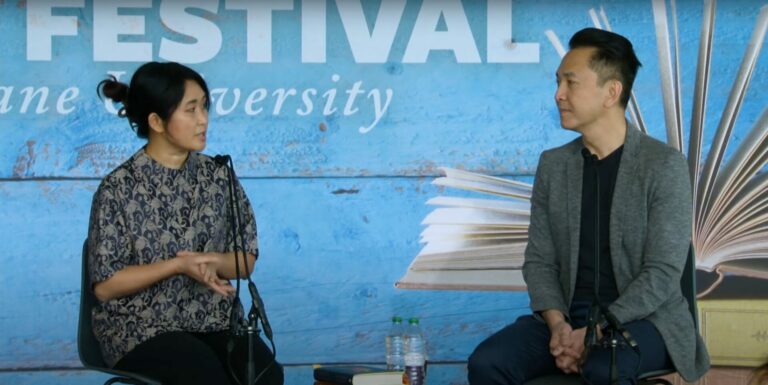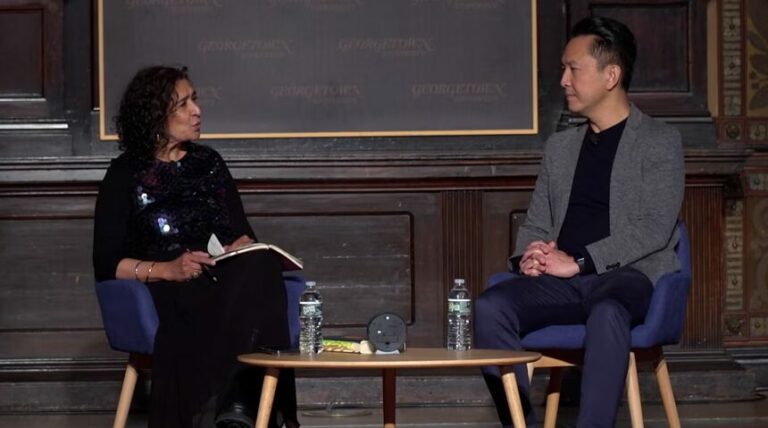The Pulitzer-winning author of The Sympathiser why he had to write about growing up as a refugee and how it feels to see one of his novels made into a TV series for Irish Independent

Vietnam is one of the most incredible places I have ever visited, and I came away with a different appreciation of what they called ‘The American War’. That led me to Vietnamese-American writer Viet Thanh Nguyen’s Pulitzer-winning political thriller The Sympathizer. He has just published a memoir — A Man of Two Facesand has picked three very varied choices for Shelf Analysis.
Viet, you start with a fellow Pulitzer Prize winner, Hernan Diaz.
I’ve just finished reading In the Distance — his rewriting of the American western myth. It’s about a Swedish immigrant who doesn’t speak English who gets on a boat thinking he’s going to New York city. He gets on the wrong boat, ends up in San Francisco and it’s his intention to try to journey all the way eastwards to New York. It’s a reversal of that western frontier story and along the way, he encounters all those various elements of the American mythology from mining to brothels. It’s a really intelligent, fascinating and erudite reworking of that mythology.
You’re going to recommend poetry for your second pick. Why is that?
When I was very young, I loved the English romantics. I loved reading poetry that rhymed that was written two centuries ago. Then I went to college and my college professors beat the love of poetry out of me!
In recent years, I’ve read quite a bit of contemporary poetry. Mai Der Vang has written a couple of books; the last one was called Yellow Rain. She’s an American-born poet of Hmong descent and the book refers to the Hmong refugee experience fleeing from Laos after the end of the Vietnam War.
They had fought with the Americans and were betrayed by the US — big surprise — and abandoned by them to face their fates at the hands of their enemies. The Hmong claimed that when they were fleeing, they were subjected to chemical warfare that they called “yellow rain” because this was dropping from the skies from helicopters and planes and no one believed them.
Your third choice is from the children’s author behind Captain Underpants. You went for one of his other series?
The book I want to focus on is actually Dog Man by Dav Pilkey. I use it as an example in my own lectures about licence and artistic freedom and the fact that children, when they read Dog Man, do not question that you can have a protagonist who has a body of a cop and the head of a dog. He has great titles like Fetch-22 and For Whom the Ball Rolls, and I think it’s a very intelligent and absolutely juvenile series at the same time. He’s totally fine making these crude, terrible jokes that only six-year-olds and people who feel like six-year-olds will laugh at. I love that.
Somehow in the realm of serious fiction we’re not supposed to break certain conventions and so I find children’s literature very inspiring as it reminds me of that.

Why write A Man of Two Faces, a memoir, now?
I thought I was a well-adjusted and a normal person when my wife, then girlfriend at the time, said “no, you’re not”. It would take me 20 or 30 years to realise she was right, that there’s something deeply wrong with me, that the writing of fiction started to gradually uncover.
In the wake of my mother’s passing in 2018, it became increasingly evident to me that the roots of it go back to my childhood and to the experiences of being a refugee and witnessing my parents’ refugee experiences, and that if I wanted to understand myself, I’d have to write about that time and its impact on me. I talk about those experiences, but I locate them in this history of war and colonisation and the refugee experience which has ruptured the world, and continues to rupture the world, for which there is no healing yet to be done.
The long-awaited TV series of The Sympathizer is almost here, starring Robert Downey Jr and Sandra Oh. You’ve been very involved, haven’t you?
Our lead producer and our co-show runner are both Canadians, which I thought was crucial because Americans cannot get their heads out of their version of the war in Vietnam. Through them we were able to bring on board Park Chan-wook, the other co-show runner, the overall creative genius behind the TV series.
His movie Oldboy was an influence on The Sympathizer so that’s a kind of a dream team. He showed up in my house clearly having read the novel, that wasn’t true for most of the Hollywood meetings I had. He had so many questions and editorial suggestions, I was like “Dude, why weren’t you there when I was writing the novel? It might have been a better novel.”
I feel that however the series turns out — and I’m not making any guarantees — what will happen is that after decades and decades of the treatment of Vietnam and the Vietnam War from white male American or sometimes even Black male American points of view, we’re going to have one that is, I think, very much from Vietnamese perspectives.
We have a whole array of Vietnamese people sometimes speaking English, but often speaking Vietnamese, for seven hours on one of the premier platforms around the world and that will budge something. That will be a lever for something.
Viet Thanh Nguyen’s memoir ‘A Man of Two Faces’ is out now. The TV series of his novel ‘The Sympathizer’ is coming to Sky Atlantic in May


